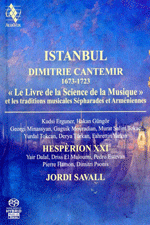> [Archived] Events

Exclusive Interview with Jordi Savall
On October 27th 2009, Jordi Savall and the ensemble he is conducting, Hesperion XXI have released a new recording called: Dimitrie Cantemir - The Book of Science of Music. This stands as the starting point for the exclusive interview made by Monica Isăcescu for Radio Romania Music, interview that is going to be broadcast on the 9th and 16th of May within the Music Success Stories radio-show (h10:30).
Jordi Savall: 'My interest for Cantemir started with his first pieces of work that I heard, in 1989. I started to get aquatinted to the collection he had composed at that time and I was surprised to notice these oriental melodies, of oral tradition, even more as they were not the result of a turkish musician's selections but of a Romanian scholar who had made such an interesting study about the Ottoman music from that time. I was very surprised, and the amazement turned into a real shock when I saw a volume that contained the pieces of work he had gathered, the scoring system invented by Cantemir approaching perfection in the manner of interpretation of this music, the tonalities, the rhythms, the heights, they were all amazing.'
The Romanian Ștefan Lemni had an important role in the realization of this disk, being author of the album's booklet, but especially of an important treaty about the Cantemir family, a personality that had also been interviewed by Monica Isăcescu.
Ștefan Lemny: 'The maestro Savall is a great scholar of the old musical texts, of old musical instruments. But the scholar is a great artist, who had achieved in giving a new life to Cantemir's music, a new vibration. I had the opportunity to listen to different types of interpretations of Cantemir's music. I admit though that I have not been impressed too much, sensing a certain Oriental monotony. Jordi Savall, on the contrary, had managed to give an extraordinary blast to this music, constantly feeding the excitement through the melodies' surprising innovations, giving them a touch of brightness and deepness, of an extraordinary exoticism. That is why, it is a real opportunity the fact that Cantemir's music could inspire an international acknowledged musician. Savall's contribution to this is huge.'
Jordi Savall is one of the most famous contemporary musicians that performs early music interpretation area-renaissance and baroque. He was twice nominated for the Grammy's and he created the soundtrack of the movie All the mornings in the world'( based on Pascal Quinard's novel, having as main characters the figures of the French composers Sainte Colombe and Marin Marais), music that has received the Cesar award in 1992. He is himself an interpreter of viola da gamba, which he brought once again into the centre on the concert stages and founded the following ensembles: « Hesperion XX » (called « Hesperion XXI », from 2000), « La Capella Reial de Catalunya » and « Le Concert des nation ». Jordi Savall has also performed in Bucharest within «George Enescu » International Festival- the 2007 edition.
Dimitrie Cantemir was one of Moldavia's princes. He lived between 1673 and 1723 and ruled Moldavia twice, for short periods of time. Since the age of 15 he spent 17 years in Istanbul, as his father's pawn near the High Porte. But as Prince of Moldavia, he turned the country's politics against the Ottoman Empire, as ally of Russia- the country in which he also died in exile.
An authentic encyclopedic spirit, Dimitrie Cantemir is one of the first greatest Romanian scholars, his extremely relevant studies were carried out in fields such as philosophy, literature, history and music.
The Book of Science of Music, written by Dimitrie Cantemir during the time of his staying in Istanbul is actually one of the first important original musicological documents in the history of music.
It contains 355 compositions, of which 9 belong to Cantemir himself, in a lettering invented by the Romanian scholar himself and he faithfully mirrors the 18th century's Ottoman musical style surprised in all of its glory and refinement.
Translated by Neculai Cristina, Andreea Velicu
MA Students, MTTLC, Bucharest University














